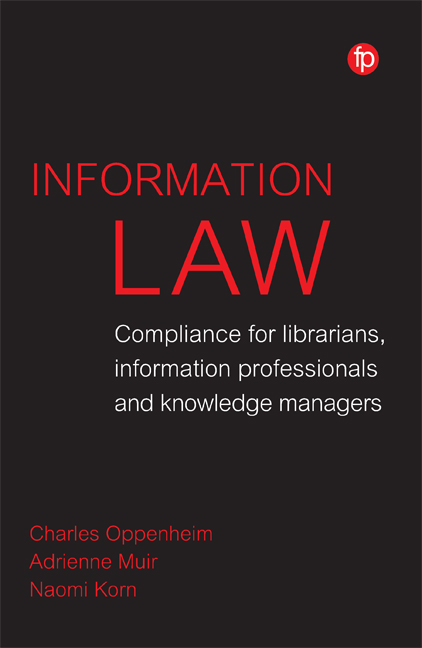Book contents
- Frontamtter
- Contents
- List of Acronyms
- List of Figures and Tables
- List of Case Studies
- Introduction
- 1 Copyright and Related Rights
- 2 Data Protection
- 3 Freedom of Information
- 4 Governance, Audits and Risk Assessment
- 5 Policies
- 6 Procedures: Copyright and Related Rights
- 7 Procedures: Using and Negotiating Licences for Access to Information Resources
- 8 Procedures: Data Protection and Freedom of Information
- 9 Tools and Templates
- 10 Awareness and Engagement
- 11 Some Speculations About the Future
- Appendix 1 Carrying out an Information Asset Audit
- Appendix 2 Sample IP Policy
- Appendix 3 Sample Data Protection Policy
- Appendix 4 Possible Contractual Terms for Online Access to Database Service
- Appendix 5 Data Protection Privacy Notice Template
- Bibliography
- Index
11 - Some Speculations About the Future
Published online by Cambridge University Press: 29 July 2020
- Frontamtter
- Contents
- List of Acronyms
- List of Figures and Tables
- List of Case Studies
- Introduction
- 1 Copyright and Related Rights
- 2 Data Protection
- 3 Freedom of Information
- 4 Governance, Audits and Risk Assessment
- 5 Policies
- 6 Procedures: Copyright and Related Rights
- 7 Procedures: Using and Negotiating Licences for Access to Information Resources
- 8 Procedures: Data Protection and Freedom of Information
- 9 Tools and Templates
- 10 Awareness and Engagement
- 11 Some Speculations About the Future
- Appendix 1 Carrying out an Information Asset Audit
- Appendix 2 Sample IP Policy
- Appendix 3 Sample Data Protection Policy
- Appendix 4 Possible Contractual Terms for Online Access to Database Service
- Appendix 5 Data Protection Privacy Notice Template
- Bibliography
- Index
Summary
Staff in LIK services are facing a challenging time. Technology is advancing apace, with exciting, yet potentially dangerous developments in artificial intelligence, and with new technologies for recording and processing personal data (such as face-recognition technologies, and the use of social media and home assistance devices such as Alexa) becoming commonplace. In the field of copyright, there have been developments both in technologies to make it easier to copy and disseminate materials to multiple audiences all over the world, and in TPM software to try to prevent easy infringement being applied. We now live in a world where everyone can be a content creator, often using multiple media, as well as a content disseminator, publisher and a content user. Sometimes we can be all of them, collectively with others. Social media platforms make it easier to share content and often blur these roles. Over the decades, the resulting role of the LIK professional has changed beyond recognition, with arguably an increased role as being an advisor on the legality of things as well as a completely changed intermediary role between the patron and the information they wish to access. But they are not the only one in that position. Increasingly sophisticated search engines, such as Google, as well as TDM and other computational analysis technologies, can quickly provide access to information, whilst the internet is becoming overwhelmed with fake news and other misleading and sometimes illegal content.
Information law is also standing rather like a piggy in the middle, again between content owners and content users. On the one hand, the law tries to encourage novel creations, freedom of expression and creativity. On the other hand, it tries to prevent abuse of the new technologies by means, for example, of data protection legislation and strong rights for content creators. However, the law faces particular challenges. The first is the tension between creators and users (in the case of copyright), or between privacy and exploitation of personal data (in the case of data protection). There is also the tension between the wish for accountable and open government so citizens are fully informed about, and can comment on, the actions of all levels of government (through freedom of information), and the wish by government agencies to maintain confidentiality for commercial or national security (or perhaps more sinister) reasons.
- Type
- Chapter
- Information
- Information LawCompliance for Librarians, Information Professionals and Knowledge Managers, pp. 153 - 156Publisher: FacetPrint publication year: 2020



